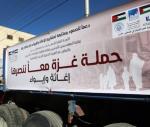You are here
Informal sector — obstacle or partner in promoting Syrian refugee livelihood?
May 24,2017 - Last updated at May 24,2017
As the Syrian refugee crisis enters its seventh year, the general discourse on Syrian refugee livelihoods has shifted.
The crisis is now characterised as protracted, and host states are taking measures to include refugees in the labour market.
However, in our rush to increase the participation of refugees in the formal labour market, we must not overlook the fact that many are already gainfully employed.
The routes to and advantages of formalisation are complex, and must be evaluated carefully against other labour market goals.
Based on the number of work permits issued, around 45,000 Syrian refugees are formally employed in Jordan.
This number rises steeply if the number working unofficially is included.
While this is problematic for a variety of reasons — lack of official worker rights, no set minimum wage, vulnerability to exploitation etc. — informality is a feature of the Jordanian economy that long pre-dates the Syria crisis.
In fact, both the Jordanian and pre-conflict Syrian labour markets exhibited high rates of informality.
Efforts to bring Syrians out of the informal sector are futile if they do not target the overall system that has created the informal economy, which makes up 44 per cent of Jordan’s labour force.
As long as Jordanians continue to work in the informal sector, so will Syrians.
A recent roundtable organised by the West Asia-North Africa (WANA) Institute and UNHCR brought together thought leaders on displacement from across the region.
One participant opined that the aversion to the informal economy observable in the current discourse is not necessarily beneficial from a perspective of improving refugee welfare.
While this may appear counterintuitive, there is some truth to the statement.
The most disadvantaged members of the Levant are also those most likely to be operating in the informal sector, and Jordan is no different.
Rather than dismissing the informal labour market based on its disadvantages, it may be better to accept its existence and the safety nets it provides, at least in the short run.
In short, in an effort to reduce aid dependency without undermining the domestic economy, it might be more expedient to work alongside the informal sector than against it.
Formal work has not consistently improved the wellbeing of refugees
Importantly, the availability of work permits for Syrians has not necessarily improved their wellbeing.
Sectors with particularly high levels of Syrian employment are agriculture and construction. Very few work permits have been issued in the construction sector, likely due to the very unstable nature of daily construction work.
More Syrians are working officially in the agricultural sector. It was the sector with the highest allowance of foreign labour, as well as the cheapest work permit to acquire until a recent decision to unify all work permit fees, regardless of the sector.
However, an estimated 70 per cent of total workers with agricultural sector permits are actually working in other sectors.
Due to the seasonal nature of agricultural work, worker rights in this sector are difficult to assess and inspect, leaving workers vulnerable to exploitation, including a high incidence of child labour and sponsors demanding commissions to apply for employee work permits.
Moreover, incentives for a sponsor to acquire such work permits on behalf of employees who then employ them in other sectors, or with other employers, are high.
Vulnerability should be taken into consideration when considering different policy choices.
A common concern among refugees is that being bound to one sponsor for an extended period restricts their freedom to move from one employer to another.
Some refugees also reference their inability to work multiple jobs, which, in the case of temporary or daily work, is essential to make a sustainable living. This makes the informal economy more appealing to some.
The formalisation of employment is, in many ways, essential to the economic development of any country. However, context matters.
It is important to validate the employment of those who are not on stable contracts as their welfare is still considerably better compared to those who are not employed at all.
This could also be understood as a means of integration into the local economy, in that the Jordanian economy is heavily driven by informality and Syrians are successfully integrating themselves into the informal sector and becoming more self-sufficient.
This should, by some measures, be considered a success.
The writer is an economic researcher at the WANA Institute working on refugee empowerment through strengthening access to labour markets. She contributed this article to The Jordan Times.












